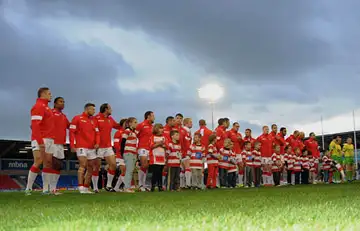Infighting puts more pressure on England and World Cup

In typical English World Cup style, the build-up to the first game against Australia on Saturday has been dominated by misdemeanours and infighting.
First, Gareth Hock was booted out of the squad for missing training, and then hours later it was revealed that six Super League clubs had stormed out of a meeting supposed to decide whether the top flight should reduce in size to 12, leaving Leeds chief executive Gary Hetherington, amongst others, “appalled”.
With the game in this country in such an apparent fragile shape, it piles even more pressure on England to perform.
Should England fall to a heavy defeat, following last week’s embarrassment against Italy, there will be even more discontent among fans, turning off the sponsors and media coverage the game craves and needs so much.
But the game isn’t helping itself. RFL chief executive Nigel Wood says the excellent news that 20% of tickets for the tournament have been bought by people new to the game.
He goes on to say they will be back next year to catch the action in Super League and the Championships.
But will they?
The World Cup has all the potential to be a great success. The format appears to have set up a range of competitive games, the best players in the world are playing, and the England team, on paper, should do well.
But when the new fans go looking for a Super League team to follow, all they’ll see is the headlines dominated by a revolt of clubs, and discontent within the game.
New fans will come along in 2014, to see the format of the league completely changed within a year, and its reputation dragged through the mud in the process, and the supposed legacy of the World Cup will be wasted.
The domestic competition is supposed to be rugby league’s strength, given its lack of reach on an international scale, although the upcoming tournament will attempt to address the balance.
Not only can the Super League dispute not take away from the World Cup during the tournament, it also must make sure that it doesn’t damage any potential growth the game might see following a successful competition.
The revolt seems to be as a result of unhappiness at the commercial and operational side of the league, handled by the RFL, and the clubs want more power.
Leeds and St Helens are the two big clubs to have sided with the RFL, although of the other six, it could be said that a handful of them have their hands tied given their precarious financial positions.
It’s hard to see how a resolution is going to be found. It seems that months of the RFL forcing its own re-structure idea on to the clubs, who, along with the players, had initially spoke out against it, has finally taken its toll and come to a head.
The carrot of extra TV money appears to have been dangled to the Championship clubs to get them on side, and they are now understandably unhappy that six Super League clubs can hold up what was supposed to be a “whole game” solution.
Either way, the game is stuck in limbo and discontent for at least five weeks, while the best World Cup we’ve ever seen must take place.
If someone with a crystal ball wants to let us know what might go on, comment below.